Plan B
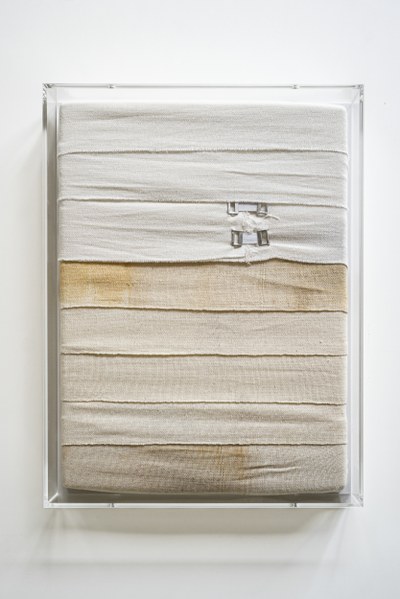
This assumption is particularly true for the cross-genre works of conceptual artist Michael Merkel. In his often representational drawings, photographs, objects, and performative installations, Michael Merkel explores topics such as sickness, health care, urban development and social transformations, memory culture, as well as everyday phenomena such as soccer. As part of the exhibition, Merkel presents three drawings and two pictorial objects made of gauze bandages.
The composition of the minimalist drawings is based on diagrams that contain data, information and specific facts. Provided with programmatic titles - "The Great Plan", "The Master Plan" as well as "The Plan B" - they show in a succinct manner a temporal sequence of events, which are marked by the indications "from here - to - there - to - there - and then somehow further". The diagrams represent linear temporal developments, but the artist leaves the starting point, the stages to be covered, as well as the destination in the nebulous. Michael Merkel uses the vagueness of the content, which stands in stark contrast to the data-based and thus scientific statement of the chosen form of representation of the diagram, to confront us with the unplannability of certain events or strokes of fate. In his research at the NCT/UCC, he has dealt intensively with the experiences of a psychooncologist and a researching physician. For both actors, as well as for the patients, the questioning of certainties and predictability in the course of treatment plays an important role. It became clear that all prognoses always carry a factor of uncertainty. The schematic drawings counter this uncertainty and insecurity and thus have something quite comforting about them. Because they make the direction clear: It goes forward, step by step, the path is the goal. It is important not to have to walk this path alone.
The aspect of care and provision is also the central theme of the gauze bandage objects. The monochrome images are made of used bandage material. Their abstract surface is structured by the running direction of the bandages, they are thus reminiscent of works of the Italian art movement "Arte Povera". Here, artists in the 1960s conceived minimalist works from so-called "poor", often found materials.

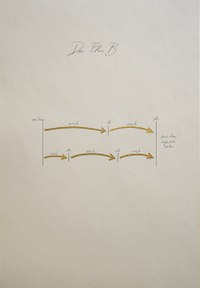
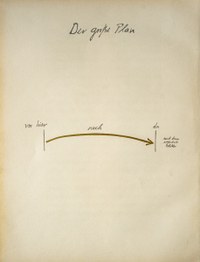
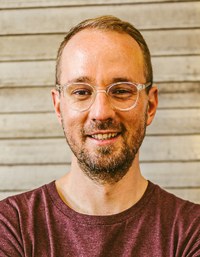
Michael Merkel (*1987 in Dresden, lives and works in Dresden)
After apprenticeship as a wood sculptor, he first studied German language and literature, cultural studies and art history at the TU Dresden and the Uniwersytet Wrocławski (Poland), before he began his art studies at the Akademia Sztuk Pięknych im. Eugeniusza Gepperta we Wrocławiu (Poland) and at the Bauhaus University in Weimar. He is a master student of Prof. Christian Macketanz at the Dresden University of Fine Arts. Merkel has already received numerous scholarships and prizes, most recently the 2023 Deutsche Bank studio scholarship.
Project partners:
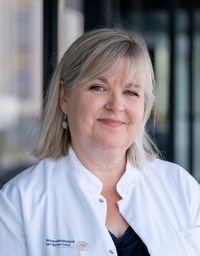
Beate Hornemann – Reduce mental stress
Psycho-oncology service, NCT/UCC Dresden
A cancer diagnosis is often experienced as a shock. This can be accompanied by various emotions such as worry, fear and sadness, which often present great challenges to those affected and their relatives. The psycho-oncology service offers professional help to inpatients and outpatients of oncology and their relatives. In addition to relieving conversations, the employees advise on how to deal with cancer and the resulting demands. The aim is to help patients come to terms with their illness, improve their psychological well-being, strengthen their social resources, enable them to participate, and thus improve the quality of life of the patients and their relatives.
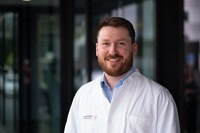
Dr. Lino Möhrmann – Genetic analysis for customized therapies
Department of Translational Medical Oncology, NCT/UCC Dresden
State-of-the-art molecular analysis methods now make it possible to precisely characterize certain changes in the genetic material or other components of cancer cells. This knowledge is an important basis for targeted therapies. In the DKFZ/NCT/DKTK MASTER program, researchers are focusing on patients with rare cancers or those who developed cancer at an unusually young age. The program combines broad molecular analysis of tumor and control tissue with the consistent recommendation and implementation of targeted therapies. The scientists were able to show, among other things, that a significant proportion of patients suffering from CUP syndrome (cancer with unknown primary tumor) - a metastasized and usually aggressively growing cancer in which no tumor of origin can be detected in the body - can benefit from this approach (Möhrmann et al., Nature Communications 2022).
.


